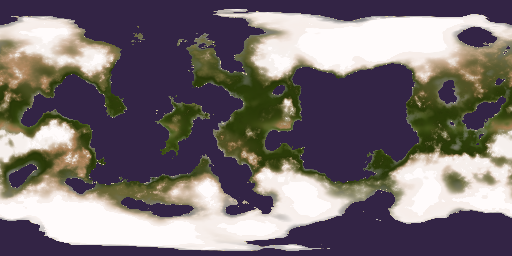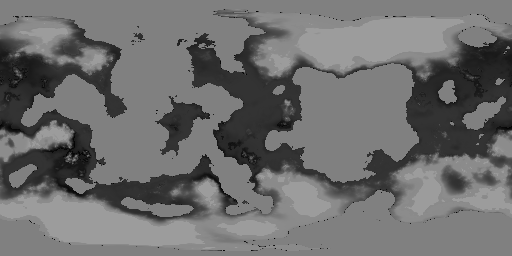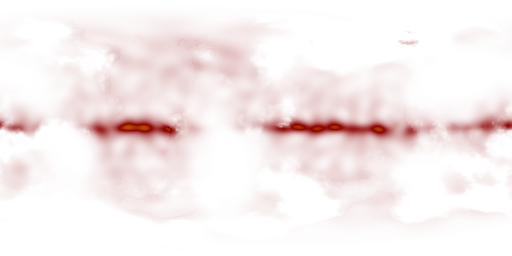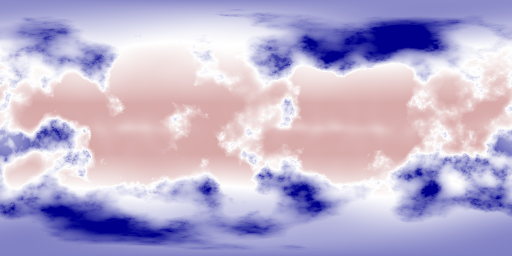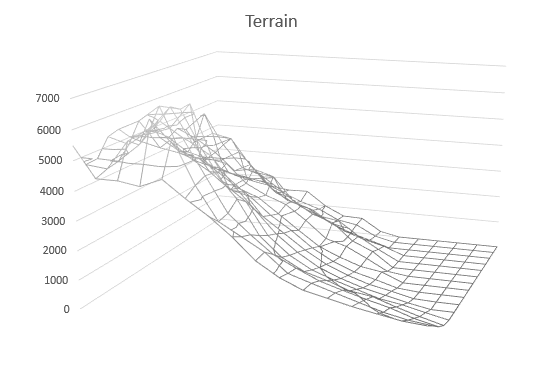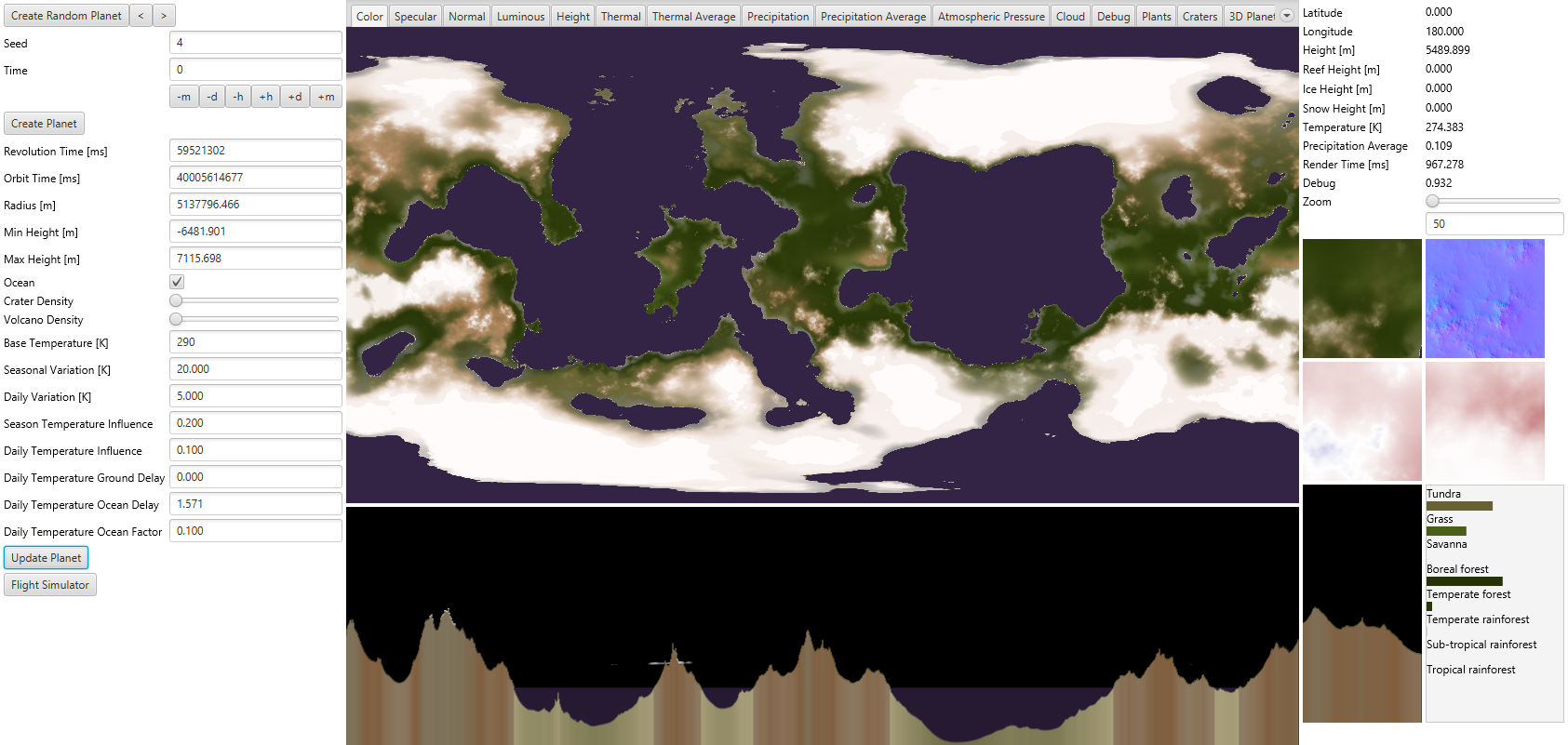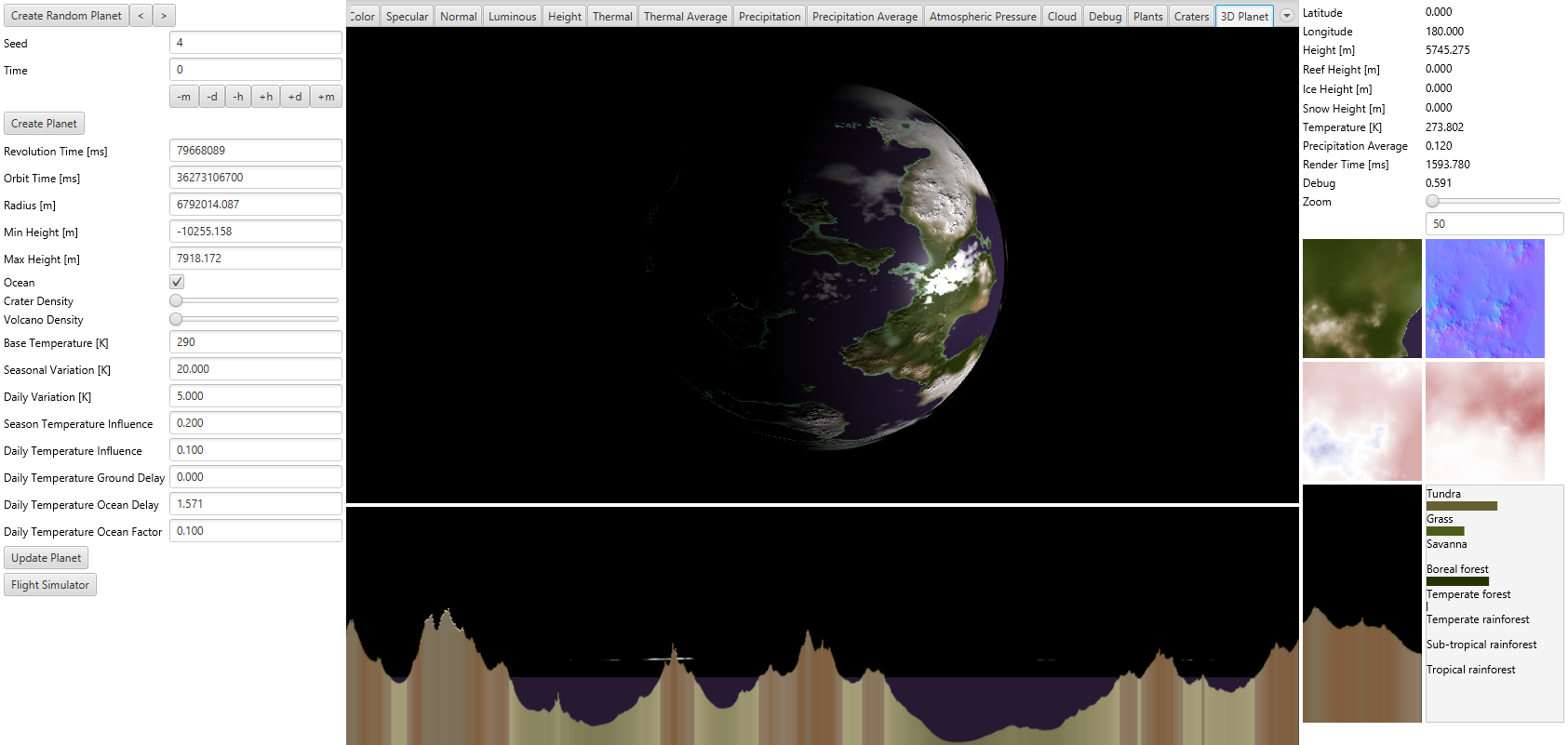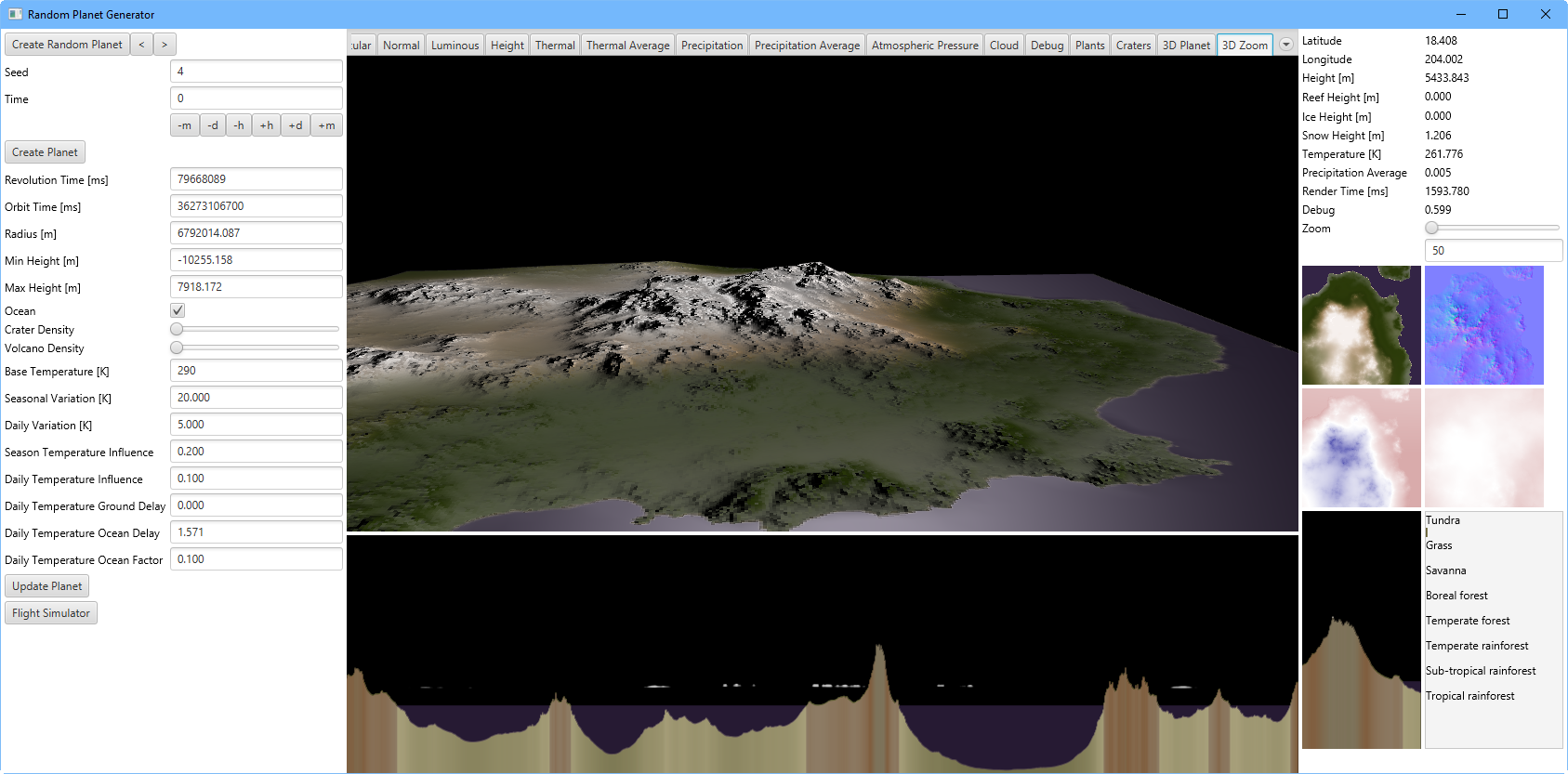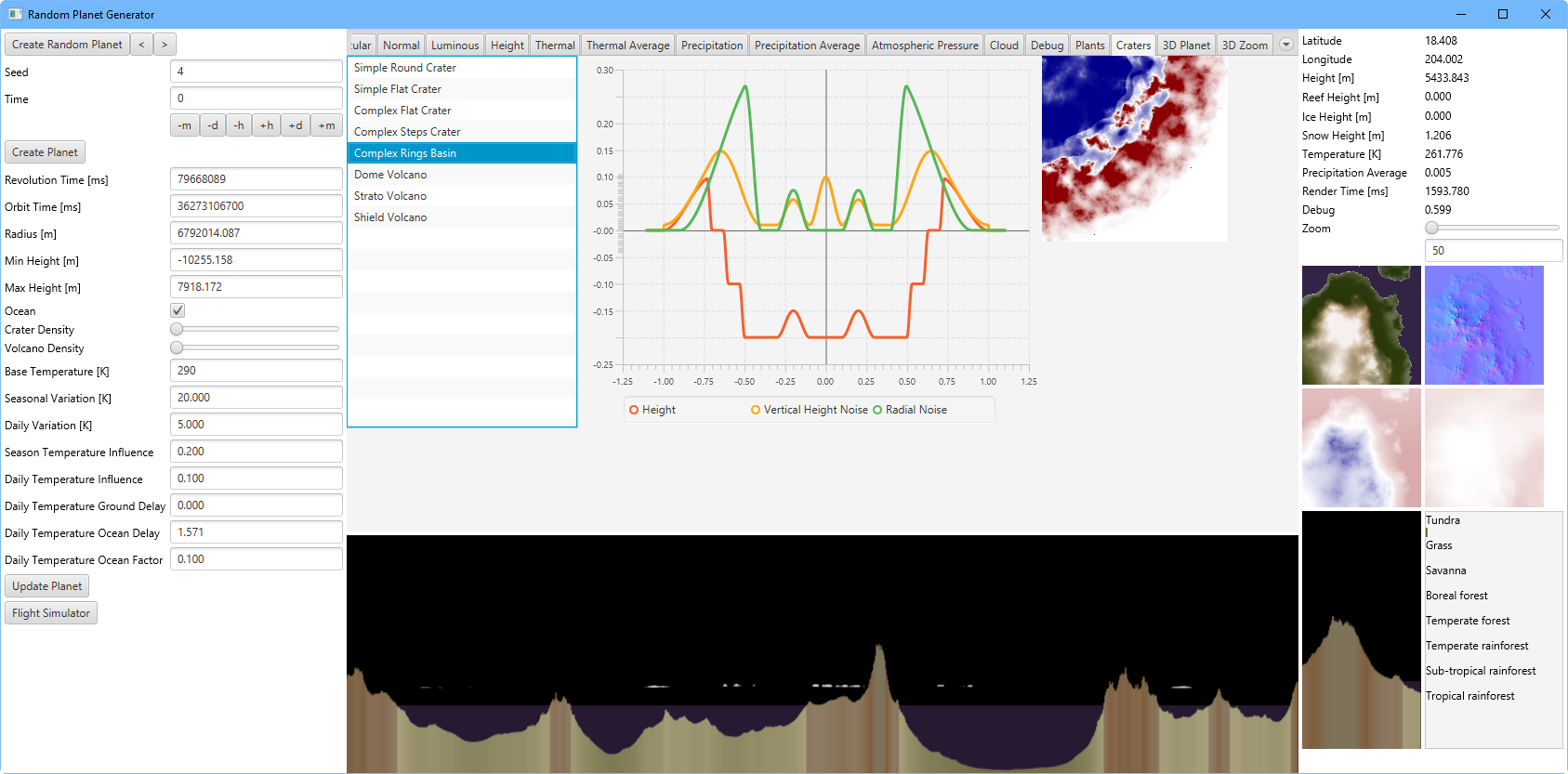Java library to procedurally generate earth-like planets.
The generator is pure Java without any external dependencies.
The viewer is a separate project that uses JavaFX.
- pure Java library
- full procedural generation
- generate different textures
- generate terrain mesh data
- query physical information for every point of the planet surface
- supports biome information
- creates impact craters
- simple physical model for temperature, precipitation, clouds, ice, snow, ...
The following code snippets show some typical use cases.
The first step to generate a planet is to define the unique random seed for the planet and generate the basic planet data from it.
PlanetGenerator planetGenerator = new PlanetGenerator();
// unique seed for the planet
long[] seed = new long[] { 4 };
// generate planet data for unique seed
PlanetData planetData = planetGenerator.createPlanetData(seed);
// print some random generated planet values
System.out.println("radius : " + planetData.radius + " m");
System.out.println("revolutionTime : " + planetData.revolutionTime + " s");
System.out.println("orbitTime : " + planetData.orbitTime + " s");
// modify generated planet data if you need to fulfill special constraints
planetData.baseTemperature = 290; // 290 K ~= 17 C ~= 62 F --- expect warm tropics at the equator, small polar caps
// create planet according to planet data constraints
Planet planet = planetGenerator.createPlanet(planetData);The output looks like this:
radius : 5137796.466254459 m
revolutionTime : 59521302 s
orbitTime : 40005614677 sWith the planet data generated we can now generate specific information for any point of the surface of the planet.
This is useful to know the conditions at the location of the player in a game.
// specify which layers and what accuracy you need (default has all layers and good enough accuracy)
PlanetGenerationContext context = planet.createDefaultContext();
// generate planet at one specific point
double latitudeRadians = Math.toRadians(90.0);
double longitudeRadians = Math.toRadians(0.0);
PlanetPoint planetPoint = planet.getPlanetPoint(latitudeRadians, longitudeRadians, context);
// print some values for the specific point on the planet
System.out.println("height : " + planetPoint.height + " m");
System.out.println("temperature : " + planetPoint.temperature + " K");
System.out.println("precipitation : " + planetPoint.precipitation);
System.out.println("color : " + planetPoint.color);The output looks like this:
height : 6015.265244579083 m
temperature : 271.7990658042786 K
precipitation : 0.0
color : (0.6295682289054663, 0.5518509754711629, 0.4010190099591988)To render an entire planet we can create the necessary textures into images.
The following example creates all texture types that the framework knows about and saves them into files.
// specify context and add the texture types you want to generate (we simply add all of them)
PlanetGenerationContext context = planet.createDefaultContext();
context.textureTypes.addAll(Arrays.asList(TextureType.values()));
// generate 512 x 256 pixel textures for the entire planet
Map<TextureType, TextureWriter<BufferedImage>> textures = planet.getTextures(512, 256, context, (width, height, textureType) -> new BufferedImageTextureWriter(width, height));
// save the textures into png files
try {
for (Map.Entry<TextureType, TextureWriter<BufferedImage>> entry : textures.entrySet()) {
String filename = entry.getKey().name().toLowerCase() + ".png";
BufferedImage image = entry.getValue().getTexture();
ImageIO.write(image, "png", new File(filename));
}
} catch (IOException e) {
e.printStackTrace();
}The following textures where generated with the sample code above.
Surface color map:
Normal map:
Specular map:
Average Precipitation Map:
Average Temperature Map:
The full set of example textures is here.
To render a terrain you need to generate the mesh and textures for the terrain.
The conversion of the terrain height map into a mesh depends on the 3D library you use in your renderer. The following code snippet simply prints the values of the height map.
// specify context and add the texture types you want to generate (we simply add all of them)
PlanetGenerationContext context = planet.createDefaultContext();
context.accuracy = 1; // meters
context.textureTypes.addAll(Arrays.asList(TextureType.values()));
// create terrainHeightMap to be filled
DoubleMap terrainHeightMap = new DoubleMap(16, 16);
// generate terrain textures and fill terrain height map for the specified area
Map<TextureType, TextureWriter<BufferedImage>> textures = planet.getTextures(
Math.toRadians(90.0), Math.toRadians(100.0), Math.toRadians(180.0), Math.toRadians(190.0),
64, 64, context, (width, height, textureType) -> new BufferedImageTextureWriter(width, height), terrainHeightMap);
// save the textures into png files
try {
for (Map.Entry<TextureType, TextureWriter<BufferedImage>> entry : textures.entrySet()) {
String filename = "terrain_" + entry.getKey().name().toLowerCase() + ".png";
BufferedImage image = entry.getValue().getTexture();
ImageIO.write(image, "png", new File(filename));
}
} catch (IOException e) {
e.printStackTrace();
}
// use the terrain height map to create the 3D mesh
for(int y = 0; y < terrainHeightMap.height; y++) {
for (int x = 0; x < terrainHeightMap.width; x++) {
if (x > 0) {
System.out.print(", ");
}
System.out.print(terrainHeightMap.getValue(x, y));
}
System.out.println();
}The output looks like this:
5489.898749837851, 4471.268777925344, 4468.983375629327, 4350.646818044562, 4649.039811173835, 4102.277022713687, 3610.966842788416, 3025.767283526434, 2336.737514165431, 1883.273910496392, 1563.916787365276, 1401.429576906501, 1232.391953872694, 1098.1179502361874, 971.170228855176, 918.1472957393389
4701.42107898749, 4621.983539315942, 5601.481916916854, 6040.508911990006, 5792.126161150626, 4337.567824918225, 3227.189370439525, 2810.606457798912, 2388.3277548438646, 1775.8112997035014, 1542.8048133370557, 1317.4937295345871, 1097.1618910509796, 880.4195784505218, 725.1598352425881, 639.8835091066876
4735.97049320655, 4709.099132146011, 5314.440398093927, 6148.248928435732, 5673.96852238723, 4477.702000195767, 3298.768303500835, 2659.8442242805677, 2080.140461505328, 1709.023843990919, 1374.0575357035013, 1151.3979602021982, 944.5455144625485, 757.2690652062702, 508.16905557473456, 333.70457602977694
5325.551715553819, 5115.942863854324, 5649.121835657635, 6484.441467290666, 5320.965403440911, 4398.987988836087, 3578.8909567429664, 2417.0024246971143, 1756.5331149753774, 1357.967179500988, 1140.6441178443629, 881.532745297256, 772.9045828487397, 519.9778724764219, 296.45671775670326, 97.53588120477889
5433.510395319024, 5770.7745289228515, 6329.7465290714035, 6272.304615145475, 4942.6670193477685, 3834.6357477129395, 3299.0006258748153, 2203.7261170348365, 1595.961265505699, 1174.001214007144, 910.139679521455, 678.0264515400104, 451.0134265841343, 333.59785979978733, 162.05429510191698, 0.0
5017.988731402772, 5173.53438082652, 5424.665827607197, 6327.460451410024, 4554.1989268912685, 3620.56654234273, 2832.79863695941, 2046.0851349458617, 1472.491777219141, 1017.552307922002, 717.6108651805707, 477.79154998035756, 307.3093901945231, 136.6215066859304, 0.0, 0.0
4709.57487925033, 4526.032651940451, 4391.042942057761, 4241.32078740184, 3856.489791402785, 3255.443931561126, 2379.7313662412935, 1854.339350011488, 1329.9056721090628, 899.6985862606089, 586.8401114208509, 347.80035242662507, 196.83049901556387, 25.218009821684063, 0.0, 0.0
5363.414858681698, 4627.28659508637, 4071.47909426318, 3614.1046110418984, 3021.1042133909186, 2836.2810000520813, 2218.2686474160664, 1738.8762782897002, 1182.5195844220698, 763.7678568912006, 468.5345595229901, 274.6664124634008, 59.82482151564545, 0.0, 0.0, 0.0
4548.413703955205, 4091.4678272434676, 3873.0508442456658, 3412.4740028284095, 2888.4328559852156, 2612.5202053880957, 2076.7330375693737, 1531.8586702210005, 1009.3558023574969, 695.5595175510007, 432.0749181559995, 313.533245332811, 0.0, 0.0, 0.0, 0.0
4375.492786389766, 3892.0148708484276, 3706.364992566344, 3574.386356110005, 2887.850843594052, 2509.4510713157642, 2223.760136962791, 1696.9984204549519, 1089.2548169124575, 868.0790696075792, 496.1299243233598, 99.22034140895084, 0.0, 0.0, 0.0, 0.0
4587.539963957511, 4243.7136342571675, 3769.4715897806173, 3129.338438523483, 3252.802988534547, 3030.7313359304308, 2177.2037740380174, 1732.7958796842713, 1478.1722312062548, 851.6346802515518, 531.5189555345514, 0.0, 0.0, 0.0, 0.0, 0.0
4396.347737013605, 5066.626635938039, 3906.690585325895, 3070.1573514891506, 2835.390074881482, 2334.9812337174744, 1765.2471962030477, 1457.7398995662725, 1337.8901132145984, 820.9090682082078, 385.75380856416905, 0.0, 0.0, 0.0, 0.0, 0.0
3752.8272756544184, 4149.132621594451, 3994.616969800699, 3019.15071959706, 2239.3489934268628, 1732.358346624028, 1528.820260020564, 1087.262186793946, 726.1892559406651, 474.02742925698567, 287.00437215288, 0.0, 0.0, 0.0, 0.0, 0.0
2886.729637822723, 2910.296766750468, 3307.3954732219545, 2554.6036917349747, 1787.0023071850037, 1432.4505996767475, 1207.924309159106, 740.3354550586755, 448.5396851382302, 225.37850590913968, 0.0, 0.0, 0.0, 0.0, 0.0, 0.0
2400.2142745172378, 2228.3421107130207, 2114.166473438371, 1947.718222190556, 1612.8597756402496, 1300.431139830308, 1056.6437969661392, 693.9479640706459, 559.1918727273969, 172.62659604277724, 0.0, 0.0, 0.0, 0.0, 0.0, 0.0
2213.204457843455, 1927.4320979217619, 1752.979830529196, 1618.5553875228188, 1516.4871246154707, 1532.746970552882, 1000.0988322189642, 644.4311497084709, 618.9590170571792, 152.05721019525845, 0.0, 0.0, 0.0, 0.0, 0.0, 0.0When you interpret these values as a 3D mesh you get the following wireframe.
The following terrain textures where generated with the sample code above and can be used to render the mesh. Note that the textures where generated with higher density than the terrain mesh.
Surface color map:
Normal map:
Specular map:
The full set of example textures is here.
For debugging purposes an interactive JavaFX viewer was written that allows to see and modify many planet data values and analyze the generated planet.
Interactive textures can be clicked to show zoomed textures, point information and a height cut.
The animated 3D terrain shows the same section of the planet as the zoom textures.
The mathematical models used to create the craters and vulcanoes can be visualized.
